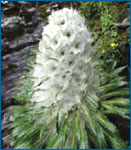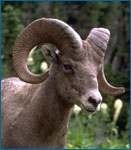Humans, it turns out, are excellent agents of evolution. Sometimes we play this role intentionally — we have, after all, artificially selected our food crops and domestic animals to suit our own purposes — but sometimes we may not even be aware of the evolutionary impact of our actions. You’ve already seen how the selective harvest of fish can cause major evolutionary changes in the body size of those animals — but fish are not the only wild species whose evolution is being shaped by human preferences:

- The snow lotus grows on the slopes of the Himalayas, where it is collected for medicinal purposes. Traditional healers preferentially gather the tallest and largest-blooming plants which are thought to be more powerful healing agents. However, now it seems that these harvesters may be causing the snow lotus to evolve into a shorter and smaller blooming form! Museum specimens collected a century ago are taller than specimens collected today and evolution is the likely culprit.

- Big game hunters, as one might suspect, tend to prefer larger animals with more impressive horns and antlers, and now the evolutionary consequences of several decades of that selective harvest are coming to light. Bighorn sheep are evolving smaller horns. Over the past 30 years, the average horn size of Bighorn sheep in Alberta, Canada has dropped from near 70 cm to around 50 cm!

- Even the elephant is not immune. Almost all African elephants and many Asian elephants have tusks — but most populations include some individuals that are “tuskless,” a condition that seems to run in families. Obviously, poachers out for ivory preferentially target tusked elephants and in so doing, apply a form of selection that favors elephants with the tuskless trait. Hence, over the past 30 years, the frequency of tusklessness has risen in several wild elephant populations around the world.
